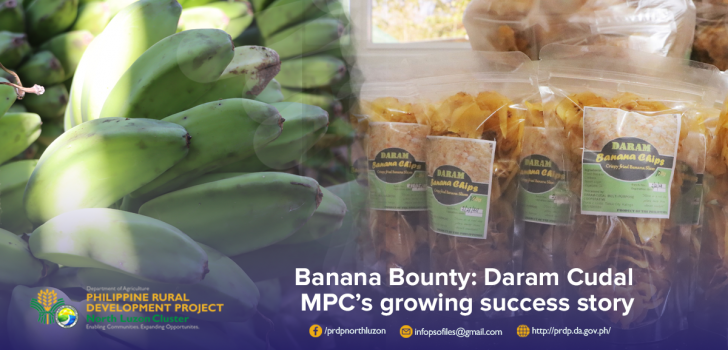
Banana Bounty: Daram Cudal MPC’s growing success story
The Daram Cudal Multipurpose Cooperative (DCMPC) emerged from the visionary efforts of its founding members, driven by a shared commitment to uplift their community’s economic situation.
Fueled by the concern for the well-being of farmers in their barangay, a group of individuals from Cudal sought to break the cycle of indebtedness that often plagued smallholder farmers who relied on individual/private money lenders for financial aid. Recognizing the need for a sustainable and community-centric solution, the DCMPC was formed in 1998 as an Association and formalized into a cooperative on October 29, 1999.
With the assistance of the Land Bank of the Philippines, the co-op set about a lending business with a lesser interest rate.
Through cooperative efforts and pooled resources from government agencies, the co-op was able to provide farmers with fair and accessible financial assistance, fostering resilience within the community.
Aside from lending, the DCMPC was able to engage in several income-generating activities over the years such as a water refilling station, agri-farm supplies, banana consolidation and marketing, and banana chips and vinegar processing.
Juliana Salibad, the longest-serving manager of DCMPC shared that their co-op had been primarily focused on the lending industry until they learned about the Philippine Rural Development Project (PRDP) in 2018.
“Cudal is the largest corn area here in Tabuk City, where the prevailing agricultural practice is mono-cropping. I noticed that relying solely on corn production is not a wise choice for farmers, as it proves to be more costly and susceptible to the effects of drought, typhoons, and calamities. So, we seized the opportunity presented by the PRDP and proposed the consolidation and marketing of bananas,” Salibad shared.
The DCMPC’s Banana Cardava Consolidation and Marketing was officially turned over to them in August 2021. They received a total investment cost amounting to PhP13.2 million which comprises a consolidation center, a 10-ton truck, several materials and equipment, and a PhP555,000 working capital.
Since the planning stage, Salibad shared that they had advocated banana cultivation among their members, and in December 2021, they finally started buying bananas. This marked the inception of their venture into banana trading, wherein they not only supported local farmers but also embarked on a journey of understanding the intricacies of the banana market.
“Even before the enterprise was turned over to us, we sought training in banana chips and banana vinegar processing which proved immensely beneficial as it enabled us to process bananas that would have otherwise been deemed unsellable,” Salibad said.
Maria Leonora Lazo, the co-op’s Business Officer, is in charge of all the co-op’s income-generating activities. She added that the members who sell their banana produce to them receive service incentives annually for selling their bananas to the co-op.
“We’ve observed that the farmers seemed satisfied with our cooperative’s services. Our flexibility regarding sizes, coupled with competitive buying prices, has resonated well with them. Additionally, we provide service incentives,” Lazo said.
When they started their banana consolidation, she acknowledged the challenges faced by the cooperative, attributing them as learnings as it was their first time to venture into this area.
“The actual losses that we experienced are higher than the projections outlined in our business plan, and as we approach our third year of operation, we have yet to attain our target. Despite these challenges, we are diligently striving to meet our objectives to ensure our members receive higher dividends,” Lazo expressed.
Another hurdle they face is the lack of bulk buyers. Typically, the DCMPC consolidates five to nine tons of bananas per week. However, due to the rapid ripening of bananas, there is a pressing need to sell them immediately, especially when the consolidation reaches around five to six tons.
Lazo further expressed her optimism about securing bulk buyers to be able to maximize the use of their 10-ton truck and mitigate losses. Like the rest of the co-op officers, she remains hopeful that it will significantly contribute to minimizing financial setbacks.
Angelito Angin, a member of the cooperative, has been cultivating bananas for nearly seven years alongside corn as a source of income. He attests to his preference of selling his harvests to DCMPC, citing their pricing and classification of bananas as key factors for his preferred choice.
Jennifer Purisima, another member of the cooperative, also attests to her preference of selling her harvests to DCMPC for the same reasons that Angin had mentioned.
“Banana farming supplements our family income alongside corn, our primary source. Unlike corn, which takes longer to yield returns, bananas provide weekly income for our daily expenses. Before DCMPC bought bananas, we faced challenges selling to private buyers who preferred larger sizes and offered low prices, resulting in meager earnings. Selling at the market incurred extra expenses for transportation and required extended hours. However, we were thrilled when Daram (DCMPC) began buying bananas. Not only did we receive better prices, but we also contributed to the cooperative’s success by supporting their enterprise,” Purisima expressed.
According to the cooperative’s latest reports, they achieved a net income of approximately PhP 248,000 from their working capital of PhP555,000.00 as of December 31, 2023.
To ensure sustainability, they initiated a 2-hectare experimental banana production site with the Department of Agrarian Reform’s support. This venture aims to enhance production and benefit their members. Additionally, they successfully requested the construction of a processing plant for banana chips and vinegar, creating a new income stream for the cooperative.
DCMPC’s journey showcases the transformative power of collective efforts in fostering economic growth and resilience within the community. Despite challenges, their commitment to achieve higher incomes is evident. Their recent net income reflects financial strides, while ongoing projects like the experimental banana site and processing facility highlight a dedication to long-term success.// Elvy T. Estacio, RPCO-CAR Writer
